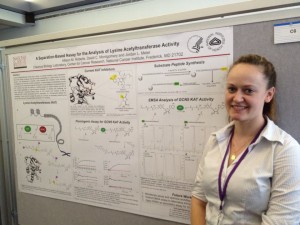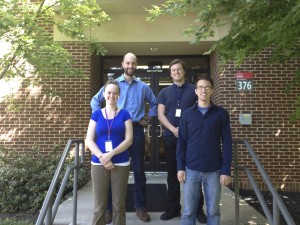Attention STEM students! Read about Honors senior Allison Roberts’ research experience at the National Cancer Institute, a new cross-post from the Center for Fellowship and Scholarship Advising (CFSA) blog. We’ve been featuring SU student winners of nationally competitive awards and asking them 6 questions about their experiences.
Want to learn more about research opportunities and other fellowships? Come hear from Professors Julie Hasenwinkel (engineering) and Larry Wolf (biology) about conducting research, REU and summer programs, and funding for graduate study.
Join us on March 28th and RSVP here: http://nationalscholarships.syr.edu/?event=friday-focus-tba-2
1) You are in a lab at SU; how did you decide that summer research at the NIH would be a good fit for your current and future goals?
Based on my research experience in Professor Robert Doyle’s lab here at SU, and my summer research experiences in Professor Bil Clemons’ lab at Caltech, I was searching for another summer internship to further my research abilities. The NIH is a renowned research institution and when I realized there was a possibility that I could intern I was thrilled.
2) What was the most surprising aspect of your research experience?
The most surprising aspect of this experience was the independence I was given. I truly felt that I could go to anyone in the chemical biology laboratory and discuss my research, or about their work. It was a very open and collaborative atmosphere that was incredible for research and learning. It was also a unique experience to watch a new lab start up. I learned a great deal about what it really takes to start up a lab from scratch, important lessons that will pertain to my future career.
3) Who was a particularly interesting person that you met?
During my time at the National Cancer Institute, I became acquainted with Dr. Christopher Campbell, MD/PhD. Not only did he help me revise and polish my personal statement for my medical school application, he also discussed the realities of a career as an MD/PhD versus MD and ultimately played a crucial role in my decision to pursue an MD. His mentorship and guidance was incredible and I plan on staying in contact with him.
4) Tell us about your research in the lab. What did your daily schedule look like?
I always like to be in lab earlier than expected, so I would try to get in around 8:30am. From there I would check my emails and check on any experiments I had running. I then planned out my experiments for the day and started work. I had a great deal of independence, which really helped develop my confidence in my research. Throughout the day I would update Dr. Meier as I saw him. There were also weekly group meetings where members presented their research. I also attended a molecular imaging seminar as well as a career fair down at the NIH in Bethesda, MD. There were a great deal of career-oriented activities and seminars I could attend and I learned a great deal from them.
5) What did you do for fun in Maryland?
Frederick, Maryland is a wonderful place to live. Market Street has a lot of quaint shops, as well as phenomenal places to eat. I also went hiking at Sugarloaf Mountain, and also drove out to Gettysburg, which was only about a half an hour away. Washington, DC is only a 45-minute train ride away. There is a lot of history surrounding Frederick as well as in the town itself.
6) Any advice for SU students applying for the Summer Internship Program with the NIH?
When applying to this program, you need to contact various principle investigators and show interest in their work. I was lucky in that Professor Doyle had a connection with a PI at the National Cancer Institute (NCI), so finding a lab I could work in wasn’t as difficult. Definitely do your research, look at the various kinds of research happening at the NCI, and don’t be afraid to do research outside your normal field. This will help diversify your knowledge and skill sets.
Anything else you’d like to add?
Working at the NCI taught me a great deal about the “upper” level of research. A lot of funding for research comes from the NIH/NCI, so being able to work there allowed me to see where it all comes from. The advanced technology and vast resources at my fingertips allowed me to truly develop as a scientist and explore career options.

